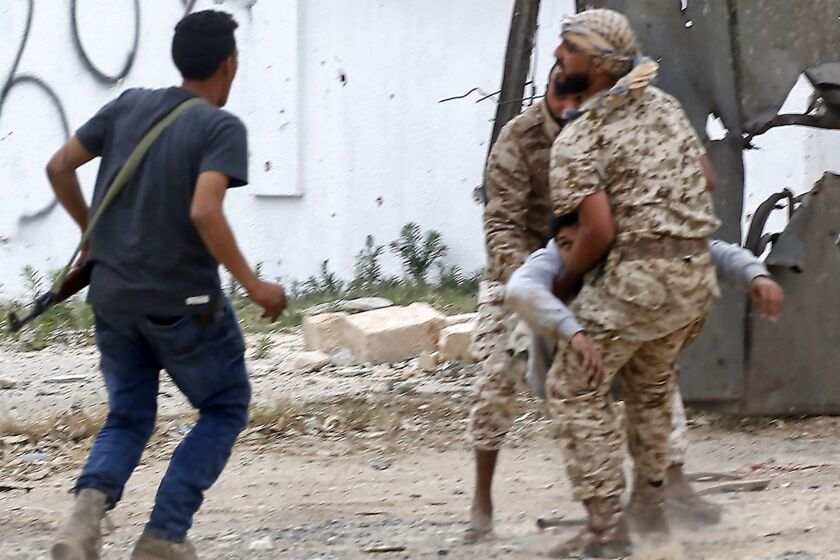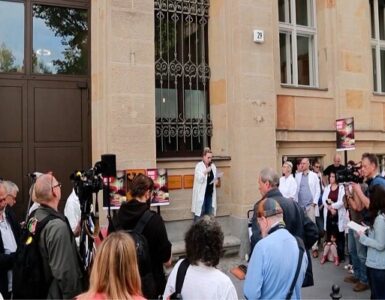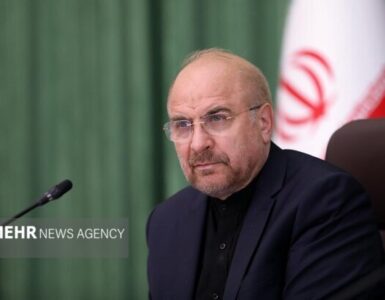
People march and shout slogans as they attend a protest in Sidi Bouzid, Tunisia on Dec. 17. Sidi Bouzid, an economically troubled region in central Tunisia, is still waiting to reap rewards from the North African nation’s revolution.(Riadh Dridi / Associated Press)
There was a chill in the air as Mona Seif walked to Cairo’s Tahrir Square from a protest outside the heavily guarded state television office known as the “fortress of lies.” Eighteen days into Egypt’s “January 25” revolution in 2011, President Hosni Mubarak stubbornly clung to power and the mood, though defiant, was subdued.
As Seif reached the neoclassical Egyptian Museum on the edge of the square, crowds of people began to scream deliriously. It took the 24-year-old activist a split second to comprehend what was happening: After three weeks of extraordinary highs and deflating lows, punctuated by state-sponsored violence, Mubarak had finally bowed to popular pressure and ended his 30-year reign.
Hundreds of thousands of people exploded in a frenzy of celebration. Women leapt in the air and men pumped their fists. Others knelt and faced Mecca in prayer.
“I just remember I cried,” said Seif. “I kept on screaming with people around me and some started hugging me. I wanted to reach my parents, but the phones were completely down, there were so many people calling. So I started … to look for familiar faces — my brother, my father.”
In that giddy moment, it was easy to believe the Arab world had fundamentally changed. Never in modern times had the region been gripped by such expectation. In December 2010, 26-year-old Tunisian street vendor Mohamed Bouazizi fatally set himself alight in an act of despair that resonated across nations. The subsequent mass protests forced the dictator Zine El Abidine Ben Ali into exile on Jan. 15, 2011, and triggered a wave of popular uprisings as the Arab Spring unfolded.
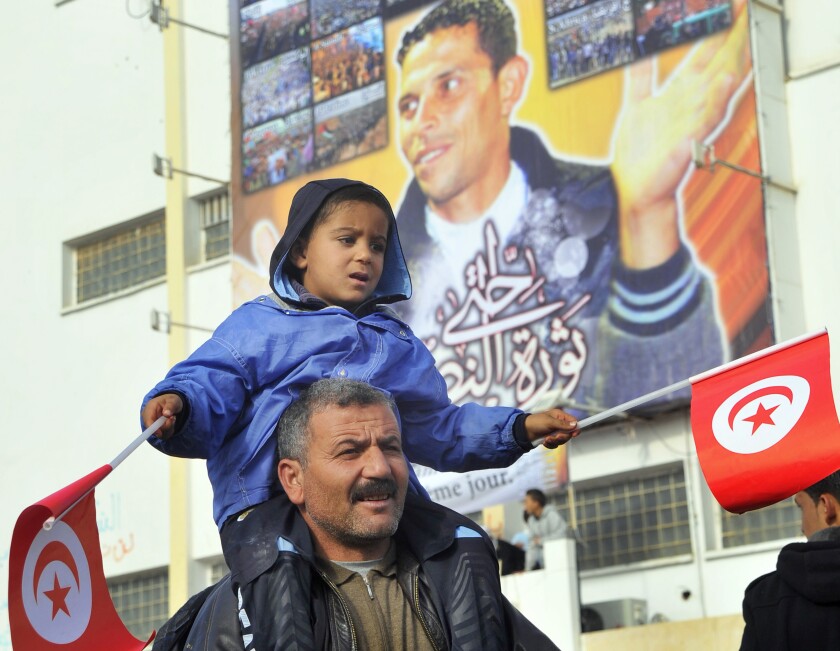
If Bouazizi’s tragic act sparked the revolutions, it was Mubarak’s fall that truly emboldened protesters throughout the Middle East, breaking a decades-long veil of fear and reinforcing the belief that the people could make a difference. As the region’s most populous nation, Egypt was traditionally its trendsetter, and Mubarak was the doyen of Arab despots. If he could fall, who was safe? For millions determined to shake up the old order, it was the moment the impossible seemed possible.
“We felt so empowered that we believed we would be able to deal with anything that came next,” said Seif, who spent the revolution shuttling between Tahrir Square and a “citizens’ journalism hub,” as activists used social media to mobilize and spread their message around the world. “We also knew that there’s something else to deal with,” she said. “But I don’t think we understood the magnitude of it.”
We felt so empowered we believed we’d be able to deal with anything. … But I don’t think we understood the magnitude of it.
MONA SEIF, EGYPTIAN ACTIVIST
It was a prescient sentiment. A decade on, Seif has never felt more fearful for the future. Her older brother, Alaa, an icon of the revolution, and her younger sister, Sanaa, are among tens of thousands of people jailed since President Abdel Fattah al-Sisi seized power in a popularly backed 2013 coup that ousted the democratically elected Muslim Brotherhood government. Egypt is more oppressive than ever. A withering crackdown that first targeted the Islamist movement has evolved into an assault against all forms of critical debate.
“I don’t operate on hope anymore. I’m mostly motivated by household survival,” Seif said, her speech racing with emotion. “The current state of things is too violent, too nightmarish.”
Her family’s experience epitomizes a decade of shattered dreams. Rather than ushering in the freedoms many Arabs yearned for, the uprisings exposed the difficulty of fostering change in nations long ruled by despots who had hollowed out state institutions and built predatory patronage networks.
The Arab Spring also highlighted the struggles of popular movements in transforming people power into institutionalized political influence. Today, it is the strongmen who still dominate, while the grievances that inflamed millions of Arabs, from systemic unemployment to corruption and yawning inequalities, remain. In many cases, they have worsened. Young revolutionaries whose courage drove the uprisings have been persecuted, with many seeking exile, exhausted by waves of crackdowns.
Syria, Yemen and Libya are ripped apart by conflict, with hundreds of thousands dead and millions forced from their homes. Even in Tunisia, which has managed a successful transition to democracy, there is an aching sense of unfulfillment.
“The revolution raised the slogans of freedom, dignity and employment. … It was carried out by the defeated, the excluded and the marginalized,” said Olfa Lamloum, a regime opponent who returned to Tunisia after Ben Ali was deposed and now runs a nongovernmental organization.
“Ten years after the revolution … they’re still marginalized. They’re still excluded. They’re still without dignity.”
She could be speaking about any of the countries where uprisings erupted. In 2011, there were about 8 million people in the Middle East and North Africa living below a poverty line of $1.90 a day. By 2018, that number had swelled to 28 million, according to the World Bank, in a region with the world’s highest youth unemployment rate.
Ten years on from that hopeful day in Tahrir Square, a recent survey of young Arabs found that nearly half of 18- to 24-year-olds had considered leaving their countries. In Libya, Egypt and Tunisia, many predicted protests could erupt again, citing corruption and lack of job prospects as the main causes of instability. Lamloum points to the thousands still making the perilous journey to Italy in boats as a sign of this despair.
“This confirms they believe there is no hope left for them in Tunisia,” she said.
Taking on Kadafi
On Feb. 17, 2011, Libyans inspired by events in Cairo and Tunis used social media to call for a “Day of Rage” to protest Moammar Kadafi’s despotic 42-year rule. The dictator responded with predictable ruthlessness, dispatching his feared security forces to demonstrations in the eastern city of Benghazi. But the protesters remained defiant.
Ahmed (not his real name) was a 22-year-old fresh out of university, determined to join the crowds filling Benghazi’s streets. On Feb. 18, he ventured out with his father.
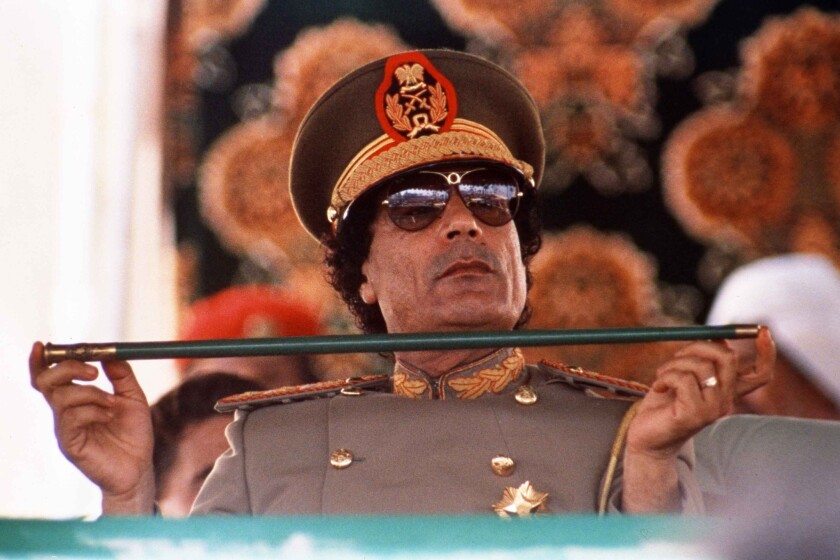
“I remember thousands and thousands all over and screaming and yelling against Kadafi … and looking at my father’s face,” Ahmed said. “He was in such awe, such disbelief, because he lived through the prime of Kadafi’s authority in the 1970s and 1980s, when colleagues [in academia] were hanged.”
As torched state buildings and police stations smoldered and the bodies of martyrs were laid to rest, the security forces began pulling back.
“It was unimaginable,” Ahmed recalled.
I first met Ahmed a few days later, when I crossed into Libya from Egypt after covering the fall of Mubarak. As Kadafi’s grip loosened, Benghazi was a city high with expectation. The old courthouse, which looked out on the Mediterranean, was a cacophony of activity, a focal point for revolutionaries who set about establishing a “national council” and publishing the first editions of the Libya Free newspaper.
Ahmed, who spoke perfect English, became my fixer. Over the coming weeks, we sped along behind trucks and cars crammed with rebel fighters toward “front lines” that in the early days were often no more than barriers erected across the desert road to Tripoli. Most had never picked up a gun in anger. Often, they would fire in the air in a show of bravado, then retreat after Kadafi’s better-equipped forces lobbed mortars and rockets in their direction. But they were resolute, and the intervention of NATO fighter jets in March neutralized Kadafi’s military superiority.
I just regret there are still governments and groups … trying to insist on either dictatorship or chaos.
AHMED, LIBYAN REVOLUTIONARY
Ahmed watched from the sidelines. He was keen to join his peers in battle, but committed to his work with me. In May, after I left Libya, he finally enlisted.
“I don’t think I would have been able to live with myself if I hadn’t done it,” he said. “It still annoys me today that I wasn’t able to reach the protests on February 17.”
Three months later, he was in the revolutionary convoy that rolled into Tripoli as huge crowds cheered their liberators. The images are still vivid: “You think these things are imaginary and made up, but it was like that exactly.” Ahmed then took part in the assault on Kadafi’s compound, which signaled the fall of Tripoli. The culmination of seven months of tumult and bloodshed, it was also an intoxicating period of hope, as the nation felt the shackles being lifted.
Academics, lawyers and others now had a chance to shape the nation in their vision. Ahmed put down his AK-47 and returned to Benghazi to raise awareness about the constitutional process, voting and political parties. Most Libyans had zero experience of elections but, in July 2012, they cast their ballots.
“It was like Libya had won the World Cup — national flags everywhere and people hanging out of cars, honking their horns,” Ahmed said. “A lot of people, even in Libya, forget how good it was because of how bad things are [now]. But if you talk to anyone and remind them of the details, they remember, yeah, actually how powerful it was.”
Syria: Assad cracks down
As Egypt, Libya and Tunisia navigated the bumpy road toward elections, Mazen Darwish was braving security forces’ bullets in Damascus. In March 2011, he was briefly detained as the Syrian uprising against the Assad regime gathered momentum. The shootings, beatings and arrests “were an early sign that it was not going to go the same way as Egypt or Tunisia,” he remembers.
A human rights lawyer, Darwish knew the risks of opposing a regime with a history of ruthlessly snuffing out dissent. But he prayed Assad would agree to compromises, so the protesters could, at least, achieve partial gains.
Early on, Darwish and others met groups of youths and warned them against violence and sectarianism.
“We thought the regime couldn’t win if the opposition used political or peaceful and moral means because our demands were patriotic,” he recalled. “But we always said if the regime managed to lure the protest movement to violence or sectarianism, it would win because these are its two favored arenas.”
He believes the opposition’s use of arms was inevitable after the regime resorted to brutal methods to crush them. It also became apparent that the struggle in Syria would not remain a domestic affair. The regime was soon supported by Iran and the militias it backed, including the Lebanese movement Hezbollah.
In 2015, Russia’s intervention tilted the war irrevocably in Assad’s favor. And as peaceful protest morphed into armed rebellion, governments such as Turkey and the U.S. provided arms and cash to the opposition, including the Islamist factions that ultimately dominated moderate groups.
Darwish and others tried to convince Islamists to avoid violence but, he said, “The regime, regional actors, domestic factions, they all had an interest in violence.”
However, it was the regime, with its chemical weapons and barrel bombs, that “started the violence and created the ground for others” to behave likewise.
Personally, I was prepared to pay the price, although I never wished for the price to be this.
MAZEN DARWISH, SYRIAN HUMAN RIGHTS LAWYER
Darwish endured this brutality firsthand. In February 2012, regime forces sealed off streets around his office in Damascus, bundled him and 15 others into a bus and carted them off to a military base. Over three and a half years of detention, he was beaten with clubs, shocked with electric prods and hung by his arms. On one occasion, his limp body was dumped among the dead, only for guards to realize he was alive.
“It was a form of revenge with no other objective,” he said, speaking in a measured tone.
He was released in 2015 to a Damascus he no longer recognized. Most of his friends had left Syria or were imprisoned or missing — among tens of thousands of people the regime had “disappeared.” Darwish escaped to Germany, joining the nearly 6 million Syrians — almost a third of the population — who have fled their homeland.
Today, Assad, with Russian and Iranian backing, has reclaimed control of most of the country. But he clings to a Pyrrhic victory as the broken nation’s economy teeters toward collapse. Millions are destitute. ISIS, the jihadi group that exploited the chaos to take over swaths of Syria, remains a threat despite losing its hold on territory.
“There are no victors in Syria,” Darwish said. “The Syrian nation lost.”
Now 47, he knows “utopian” thoughts of regime change are delusional for the foreseeable future, though he believes Assad will eventually be replaced from within as his foreign backers realize they are better off without him.
“The regional and international players will reach a point … where it will no longer be possible to invest in the Syrian war,” Darwish said. But even that seems optimistic for now.
A devastated Yemen
Yemen was already one of the most fragile Arab nations before uprisings erupted against its veteran president, Ali Abdullah Saleh, in the last days of January 2011. Tribalistic, impoverished and blighted by a corrupt, weak state, it was awash with arms and a base for one of Al Qaeda’s most active branches.
After months of protests, Saleh, a despot who once compared ruling Yemen to “dancing on the heads of snakes,” agreed to a transition that would end his 33-year reign. Another aging veteran of the regime, Abd-Rabbu Mansour Hadi, took over, but all the old problems continued.
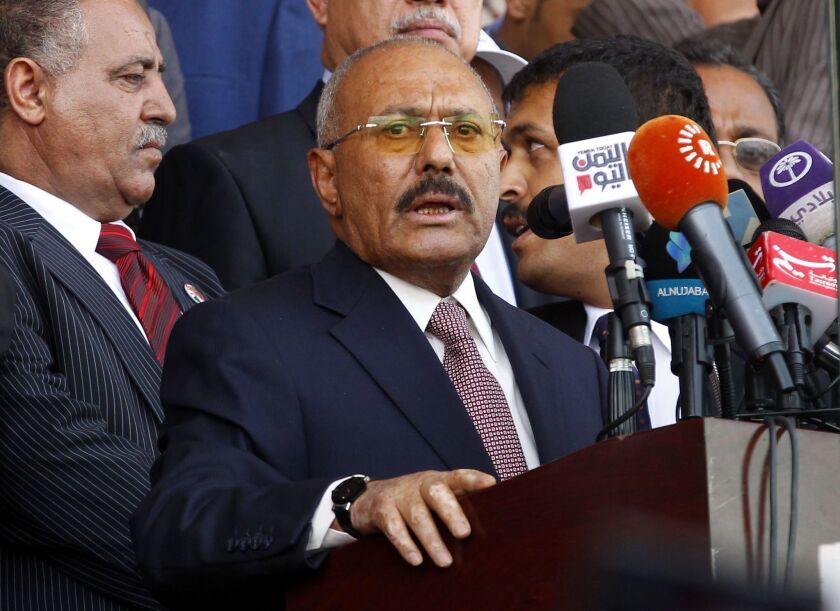
“You had all these hopeful messages on the political side, while people saw a deterioration in every basic service,” Rafat al-Akhali told me. “Corruption and patronage was even expanding as new powers came into the transition.”
Akhali saw it happen from close up. He left Yemen’s capital Sana as a 19-year-old after winning a scholarship to Canada in 2002 but continued to work with youth at home. He returned when the revolution was in its infancy, convinced the “tide had changed.” After the transition, he took a post with a government bureau that oversaw reforms, believing the moment was ripe to push for change from within.
It was not to be. As the government foundered, the Houthi movement of battle-hardened Islamists from the country’s north saw an opening to move on Sana, vowing to sweep the corrupt from office. Young militiamen took over ministries, stopping and searching Cabinet members. Akhali, who was briefly youth and sports minister, recalls how teenage fighters, AK-47s and rocket-propelled grenades slung over their shoulders, demanded to see government documents, even though many were illiterate: “They’d hold the paper upside down and say, ‘What is this? You are not allowed to bring this in.’”
Akhali realized the state in Yemen was a “mirage”: “You suddenly find there’s no military, no security — there’s nothing.” In January 2015, the Houthis attacked the presidential palace, forcing Hadi’s government into exile. The region’s next proxy war was about to explode.
Days after this assault, King Salman ascended the throne in neighboring Saudi Arabia and appointed his favorite son, Prince Mohammed bin Salman, as defense minister. The 29-year-old MBS was on a fast track to becoming crown prince. By March, he was spearheading a Saudi-led offensive — blessed by Washington — against the Houthis, who are viewed by Riyadh as an Iranian proxy stoking conflict in their backyard.
It’s not up to international powers to say, “You have to have electoral democracy in two or three years.” No state was formed in two years.
RAFAT AL-AKHALI, FORMER YEMENI MINISTER
In Sana, Akhali, his wife and two young sons fled to their basement as fighter jets pummeled the neighborhood. After two weeks of bombardment, they jostled through crowds and boarded an evacuation flight to Jordan.
“It was the worst thing to be woken up by an explosion, so we thought we needed to get out for a few weeks until this stuff is done and [the warring parties] reach an agreement,” he said.
It would be four years before Akhali returned, fleetingly, to a devastated nation stalked by disease, with 14 million people — about half the population — at risk of famine. The United Nations describes Yemen as the world’s worst man-made humanitarian crisis.
According to a 2019 report, about 60% of the more than 233,000 Yemenis who have died, either in fighting or through lack of food or access to services, were children under 5. Thousands of boys have been recruited as child soldiers; young girls have been forced into marriages by desperate families.
Saudi Arabia, meanwhile, is bogged down in a conflict it cannot win while the Houthis retain their hold on Sana and the north. Akhali relocated to the United Kingdom and is a fellow at Oxford University’s Blavatnik School of Government.
“It seems if you want to have any change, you need foreign backing and you need weapons,” he reflected. “Can we effect change at this time? That’s the question I struggle with.”
Lessons from Libya
In Libya, Ahmed’s nagging doubts about the country’s trajectory grew as neophyte politicians failed to knit together a functioning state and as armed factions, born out of the revolt, battled over the oil-rich nation’s resources. He recalls predicting to his mother in 2014 that there was going to be a war that year.
“She was like, ‘What are you talking about?’ I told her, ‘The polarization, it’s just escalating.’”
But even he underestimated how bad it would get, as Libyan warlords, such as the septuagenarian former military officer Gen. Khalifa Haftar, carved the country into fiefdoms.
“Everything we had struggled for, [Haftar’s forces] were like just, bang, undo it,” Ahmed said. “Life just stopped … it was the whole thing, street-to-street fighting, jets bombing, tanks in the street.”
He views Haftar as a wannabe dictator in the mold of Kadafi. But the general’s self-proclaimed assault against Islamists resonated with Egypt and the United Arab Emirates. Militias in the west of Libya, some Islamists, drew backing from Qatar and Turkey. On April 4, 2019, Haftar launched an offensive against a weak UN-backed government in Tripoli, triggering a proxy war on the Mediterranean’s southern shores.
When I visited Tripoli last February, the capital had been under siege for months. As fighters hunkered down in abandoned, bullet-scarred homes, civilians in surrounding areas lived in fear of the next rocket or drone attack. Turkish intervention turned the tide against Haftar and today there is an uneasy peace, but many say foreign powers will determine their country’s future.
“There were definitely a lot of wrong decisions made by Libyans, the fighting, watching the attacks against each other. So we definitely need to take responsibility,” Ahmed said. But “70% of it is an international conflict, Libya is just the battleground.”
Ahmed, who is now studying for a master’s degree in peace and conflict studies in Turkey, says one lesson of the past decade is that if the guns do fall silent, local actors should not be pressured to rush transition periods. Ahmed and Akhali argue that internationally backed initiatives often put too much emphasis on elections, instead of supporting fragile states to build effective institutions and lay the foundations needed to ensure voters have buy-in and outcomes are respected.
Akhali said “electoral democracy” should be an end result, not a starting point. “It’s not up to international powers to say, ‘No, you have to get there in two or three years.’ No state was formed, or evolved, in two years.”
‘Rebuilding from zero’
Even the most successful Arab Spring experiment underscores how hard it is for countries to emerge from dictatorship. Tunisia has many elements of stability that have eluded others. The military is not powerful enough to meddle in politics. The main Islamist movement, aware of the regional dynamics, was quick to rebrand as a Muslim democratic party and cooperate with secular parties. There is also a vibrant civil society and greater social freedoms.
Yet unemployment has remained at about 15% and there are still gaping regional inequalities. Many Tunisians are angry at politicians they see as self-interested and unable to work for the public good.
“We are rebuilding from zero,” said the Tunisian civil society activist Lamloum. “We lived under dictatorial regimes for decades. … The absence of alternatives and the difficulty of constructing alternatives goes back to that.”
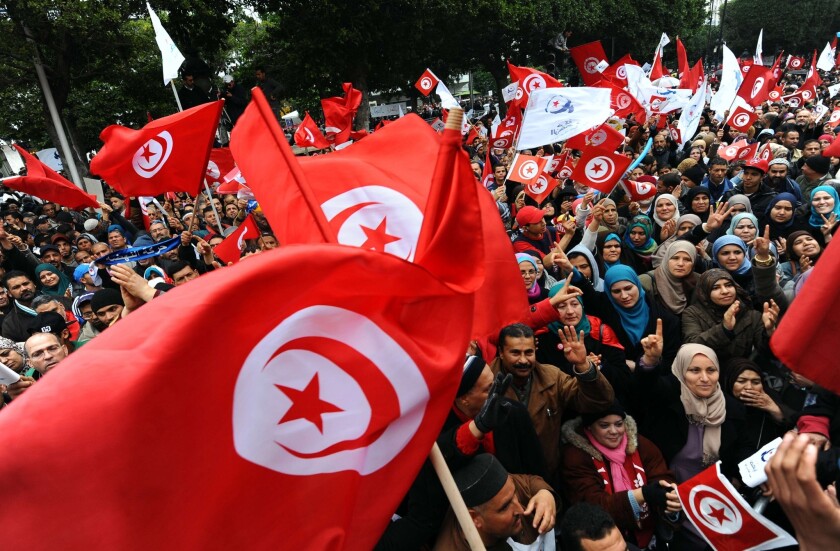
According to the International Monetary Fund, Tunisia needs about five years of 5% growth even to reduce unemployment to 11%. Yet the economy expanded by an average of 1.7% from 2010-17, far below the decade before spring 2011. Still, Lamloum said there is no sense of “crushing defeat.”
“There are still youths who have not been defeated and are still able to fight some battles — and win them,” she said. “The revolution did not succeed, but in my opinion the revolution lost a battle, it did not lose the war, the bracket has not been closed.”
All those interviewed agreed the uprisings had been inevitable, whether in 2011 or at another point, due to the conditions people were living under. Ahmed said: “There was so much good, but so much bad as well.” Citing historical precedents, such as the 1968 Prague Spring, he said “these springs take time.”
“I just regret there are still governments and groups of interests who don’t want these societies to have freedom,” he added. “They are still trying to insist on providing two options, either dictatorship or chaos.”
In Yemen, Akhali says warring factions will ultimately thrash out a power-sharing agreement, but then comes the daunting task of rebuilding a devastated society. “Is it fixable? We have to cling to that hope,” he said.
The revolution did not succeed, but in my opinion the revolution lost a battle, it did not lose the war.
OLFA LAMLOUM, TUNISIAN NGO DIRECTOR
In Berlin, Mazen Darwish keeps his revolutionary flame flickering as president of the Syrian Center for Media and Freedom of Expression. He documents abuses in Syria and helped German prosecutors charge a notorious former intelligence officer, Anwar Raslan, with war crimes. It is, he said, his way of keeping “justice on the table” and preventing “the politicians, the princes of war … the regional governments” from agreeing political settlements that fail to secure a genuine peace based on accountability.
When he reflects on the events of a decade ago, Darwish said Syrians were pushed to revolution by “years of despotism, of backwardness and bad economic and social conditions … but it isn’t possible to have real structural change without a heavy price. Personally, I was prepared to pay the price, although I never wished for the price to be this. Never.”
In Cairo, Mona Seif planned to begin a PhD, but has put her studies on hold to focus on the plight of her brother and sister. The rearrest of Alaa — a blogger who was detained in September 2019, six months after completing a five-year jail term — “made me realize I can no longer try to sustain a normal life,” she said.
Seif, who documented abuses by the security services, can barely hide her anger as she struggles to comprehend the popular support for the 2013 coup that brought an end to Egypt’s brief democratic chapter. She never understood those people, some of whom had packed into Tahrir Square to call for Mubarak’s resignation, “selling the idea of a pragmatic choice” of siding with the military because they loathed the Muslim Brotherhood government.
“There was this notion … [among] a lot of Sisi supporters … that, ‘Yes, the army was going to commit massive violations, but it’s never going to touch us, it’s going to be against Islamists.’” It was a period, she said, that “changed our worlds, our social circles and friendships.” Egyptians, like many other Arabs, argued over the question of stability versus democratic freedoms. “I never felt so alienated.”
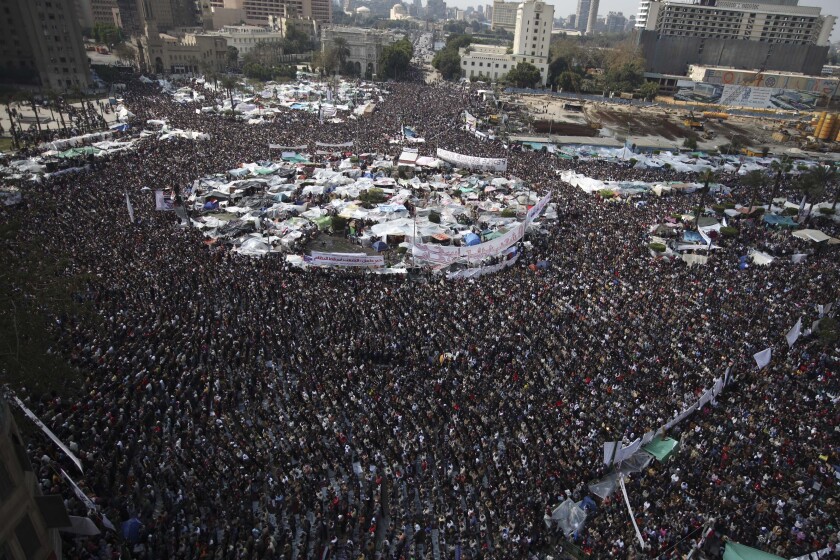
When I returned to Cairo for the 2018 presidential election, virtually all forms of critical debate had been silenced. The president secured 97% of the votes. Those businessmen willing to talk on the record lauded Sisi for returning stability and reviving a bankrupt economy after the Brotherhood’s divisive and turbulent rule.
But an improving macroeconomic picture often masks the reality for most — in Egypt, poverty has continued to rise. Even before the 2011 uprising, the country was attracting record levels of foreign investment and enjoying a spurt of healthy growth.
HA Hellyer, an Arab-English Middle East analyst, describes a “tinderbox” in the region, where the structural problems, from economic inequalities to demographic pressures, are worse than before 2011. The coronavirus pandemic has exacerbated these.
He says leaders could push through reforms and provide better services to ease people’s frustrations, but “instead, I think they’ve decided, ‘We tried this whole opening-up thing a decade and a half ago and that resulted in inadvertently empowering civil society that eventually led to the events of 2011. So they are going to clamp down and make sure it never happens again.’”
Things can’t go on like this indefinitely, he said. “It doesn’t mean things are going to blow up tomorrow, but … at some point it will crack.”
In the past two years, such cracks appeared with protests in Sudan, Algeria, Iraq and Lebanon forcing political resignations. Once more, however, they revealed the challenges of securing substantive change from the street — in the latter three, ruling elites remain entrenched, while in Sudan the military shares power with civilians in a transitional government.
In Cairo, Seif describes a “brewing anger beneath the surface.”
“This is very similar, but in a more intense way, to 2010, where many of the younger generation were feeling that there was no space for them, for work or having families or any kind of future,” she said. “The current situation cannot be sustained forever, but I don’t know if that will lead to another 2011 — I didn’t expect a 2011.”
Like other activists, she sounds worn down, the glorious moments of revolution not forgotten, but overwhelmed by what followed. She keeps the memories of 10 years ago hidden deep inside, “protected from all the darkness,” and said she will only truly begin to reflect when she’s sure of the safety of her family and friends. But like others interviewed here, she has no regrets about standing up to power.
“It’s weird because I’m not saying it as a statement. I actually questioned myself a lot and I find it so strange that despite all of this happening, at my lowest moments, never once did I feel, ‘I regret the revolution.’”
Andrew England is the Financial Times’ Middle East editor. Additional reporting by Heba Saleh, FT North Africa correspondent.


